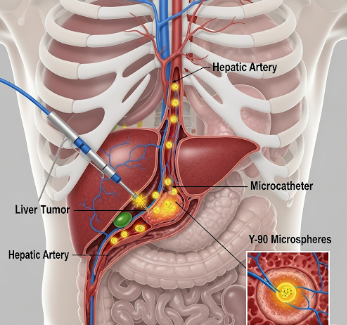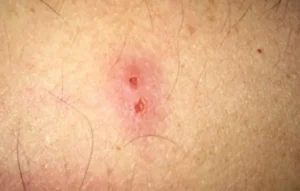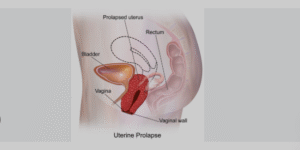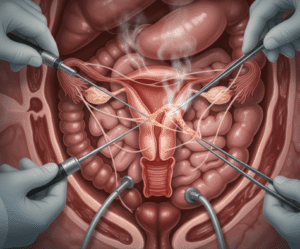Overview
Y-90 Treatment, also known as Yttrium-90 radioembolization, is a minimally invasive therapy used to treat liver tumors, particularly primary liver cancer (hepatocellular carcinoma) and liver metastases. The procedure involves injecting radioactive microspheres (Yttrium-90) directly into the blood vessels feeding the tumor, allowing high-dose radiation to target cancer cells while sparing healthy liver tissue.
South Korea is recognized for advanced interventional radiology, precision oncology, and liver-focused care, providing patients with highly targeted treatment, reduced systemic side effects, and comprehensive follow-up.
Y-90 Treatment is typically recommended for patients who:
- ➤ Have primary liver cancer not suitable for surgery or ablation
- ➤ Suffer from liver metastases from colorectal, breast, or neuroendocrine tumors
- ➤ Require palliative treatment to reduce tumor burden
- ➤ Seek minimally invasive, targeted liver therapy
What is Y-90 Treatment?
Y-90 Treatment is a form of internal radiation therapy (radioembolization). Tiny beads containing Yttrium-90, a radioactive isotope, are delivered directly into the arteries feeding the liver tumor. These microspheres:
- Deliver high-dose localized radiation to tumor cells
- Minimize exposure to surrounding healthy liver tissue
- Can be used as a bridge to surgery, transplantation, or systemic therapy
Key points:
- Performed by interventional radiologists using catheter-based techniques
- Typically done under local anesthesia with sedation
- Outpatient or short hospital stay is possible
- Korean hospitals utilize advanced imaging (CT, MRI, angiography) and real-time monitoring for precise microsphere delivery
What are the Benefits?
✔ Targeted treatment for liver tumors with minimal impact on healthy tissue
✔ Minimally invasive, reducing recovery time
✔ Can shrink tumors to make them resectable
✔ Effective for patients not eligible for surgery
✔ Korean clinics provide advanced imaging and real-time guidance for accurate microsphere placement
Additional benefits include:
- ➤ Reduced systemic side effects compared to chemotherapy
- ➤ Can be combined with other treatments like TACE, systemic chemotherapy, or immunotherapy
- ➤ Outpatient or short-stay procedure reduces hospital time
- ➤ High success rates in controlling tumor growth and relieving symptoms
Procedure Details:
1) How should I prepare for Y-90 Treatment?
- ● Medical evaluation: Liver function tests, imaging (CT/MRI), and tumor mapping
- ● Angiography assessment: Pre-procedure mapping of hepatic arteries to ensure safe microsphere delivery
- ● Medication review: Blood thinners or anticoagulants may require temporary adjustment
- ● Fasting: Usually 6–8 hours prior to procedure
- ● Korean hospitals: Provide pre-treatment angiography, imaging guidance, and personalized planning
2) What happens during the procedure Y-90 Treatment?
- ➤ Anesthesia: Local anesthesia with conscious sedation
- ➤ Procedure steps:
- A catheter is inserted through the femoral or radial artery
- Catheter navigated to hepatic arteries feeding the tumor
- Y-90 microspheres infused directly into tumor vasculature
- Imaging confirms accurate distribution of microspheres
- ➤ Duration: Approximately 1–3 hours depending on tumor location and size
- ➤ Korean advantage: Use of state-of-the-art angiography, advanced microsphere delivery systems, and interventional radiology expertise ensures safety and efficacy
3) What happens after Y-90 Treatment?
- ● Immediate care: Monitor vital signs and liver function; mild fatigue or abdominal discomfort may occur
- ● Activity: Most patients can resume normal activities within a few days
- ● Follow-up imaging: Typically at 4–8 weeks to assess tumor response
- ● Side effect management: Anti-nausea medications, pain relief, and liver function monitoring
- ● Korean hospitals: Offer structured follow-up, multidisciplinary liver care, and patient education
Risks / Benefits
✔ Benefits:
- ✦ Highly targeted treatment with minimal effect on healthy liver
- ✦ Minimally invasive with outpatient option
- ✦ Can shrink tumors for surgery or transplantation
- ✦ Low systemic toxicity compared to chemotherapy
⚠ Possible Risks (rare):
- ➔ Fatigue, mild fever, or abdominal discomfort
- ➔ Liver enzyme elevation or temporary liver dysfunction
- ➔ Gastrointestinal ulcers or bleeding if microspheres reach non-target organs
- ➔ Rare radiation-induced liver disease
- ➔ Infection or bleeding at catheter insertion site
Recovery and Outlook
- ➤ Immediate recovery: Monitored for a few hours post-procedure; mild fatigue or nausea may occur
- ➤ Hospital stay: Often outpatient; some may require overnight observation
- ➤ Long-term outcome: Effective in controlling tumor growth, reducing symptoms, and preparing patients for further therapy or surgery
- ➤ Korean advantage: Hospitals provide expert follow-up, liver function monitoring, and multidisciplinary support for optimal outcomes
When To Call the Doctor
Contact your medical team if you notice:
- ⚠ Fever or signs of infection
- ⚠ Severe abdominal pain or persistent nausea
- ⚠ Jaundice or worsening liver function
- ⚠ Unusual bleeding or swelling at catheter insertion site
- ⚠ Any sudden changes in health or new symptoms post-treatment
Best Korea Option / Process
South Korea is a world leader in interventional oncology, including Y-90 radioembolization, due to:
- 🌟 Highly skilled interventional radiologists with liver specialization
- 🌟 Advanced angiography and imaging-guided delivery systems
- 🌟 Minimally invasive procedures with precise targeting
- 🌟 Structured multidisciplinary care including oncology, hepatology, and radiology
- 🌟 Multilingual support for international patients seeking cutting-edge liver treatment
Top Korean Hospitals for Y-90 Treatment:
- ✅ Seoul National University Hospital (Interventional Radiology & Oncology Dept.)
- ✅ Asan Medical Center
- ✅ Samsung Medical Center
- ✅ Severance Hospital (Yonsei University)
- ✅ Bundang CHA Hospital
✅ Quick Highlights Recap
- ➤ Minimally invasive targeted liver cancer treatment using Yttrium-90 microspheres
- ➤ Effective for primary liver tumors and metastases
- ➤ Outpatient or short hospital stay with rapid recovery
- ➤ Rare but manageable risks with expert care
- ➤ Korean hospitals provide advanced imaging, precision microsphere delivery, and multidisciplinary follow-up













